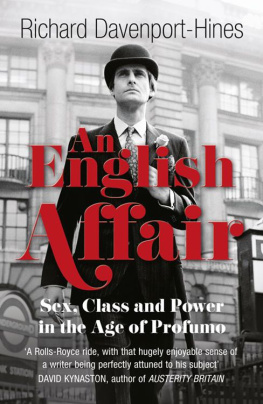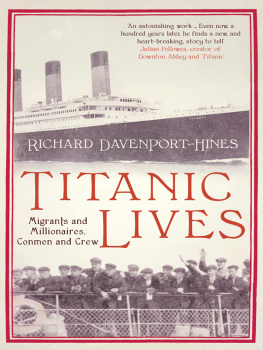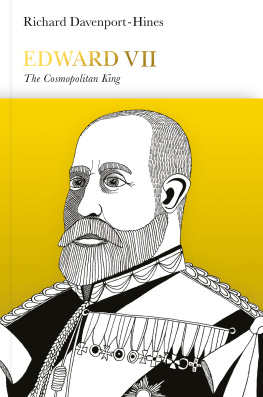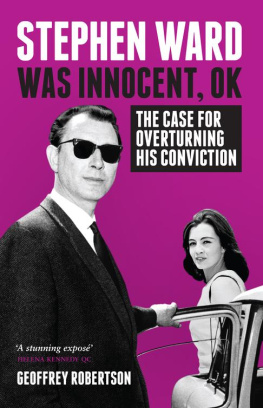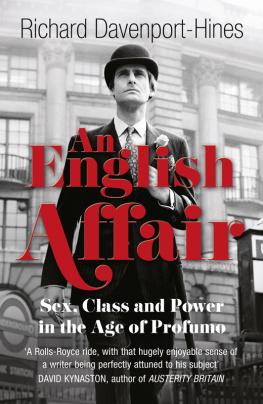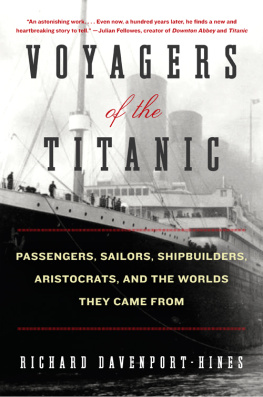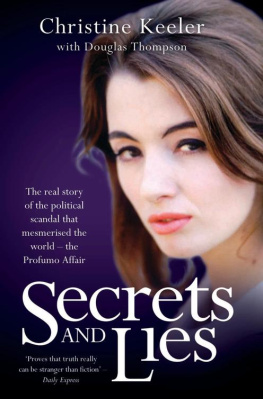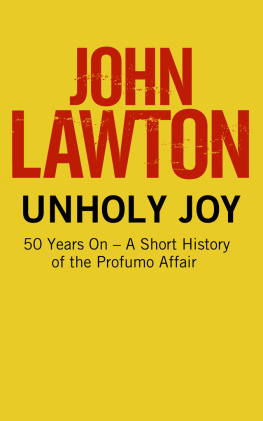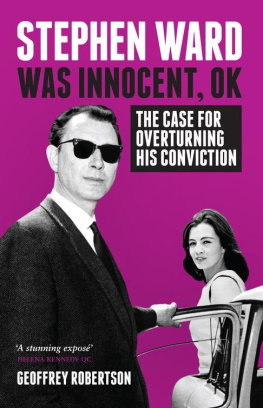RICHARD DAVENPORT-HINES
An English Affair
Sex, Class and Power in the
Age of Profumo

For Jenny, Christopher and Hugo, and never forgetting Cosmo
Though most English men and women cannot let themselves go, they love to think and read about people who do throw off inhibitions, either with sex or violence provided they are punished.
Geoffrey Gorer, This is the English, The People, 30 September 1951
Snobbery of all kinds and prurience are the two most obvious vices of this country.
Anatomy of Hysteria, Spectator, 15 November 1957
One thinks immediately of all the dreary little snobberies, the triviality, the emptiness, the susceptibility to stupid vogues. How drab and provincial we have become! How enslaved to gimmicks! English inventiveness and energy, which used to be an example to the world have they dried up altogether, or is it simply a bad period we are going through? The two great inventions of the English, their political system and their literature, both seem at the moment rather dwindled and shabby. The parliamentary two-party system has become, whether temporarily or forever, a mere contest between public relation outfits, with professional ad men in the back room.
John Wain, The Month, Twentieth Century, July 1959
CONTENTS
In May of 1963, when I was nine, Miss Vera Groom, the old spinster who taught me English, asked her class to name a noun beginning with a vowel. There was a new word that I was proud of knowing. I had discovered it from the cooks Daily Express. I raised my hand, and in response to a nod from her cried out Orgy! Miss Groom trembled: she gripped the edge of her desk; her face flushed with blood; her skin turned puce. You are a foul boy, she said, and sent me to be caned by the headmaster.
A few days later Mr Wilcox addressed the school. It was the year Dr No sold 437,000 copies in paperback. Warner Wilcox was then in his early forties, but seemed old to me. Like many headmasters of his time, he was both overbearing and anxious. Dark-browed, stern, conscientious, he had a jolly wife who could not soothe his pent-up tension. When he rebuked his school, he would spring up and down on his heels, as if he was going to bound forward into the boys and start cuffing them. It has come to my attention, he said in a storm of tense heel-jerks, that boys are bringing James Bond novels into school. I will not have them on the premises. They are sad-is-tic novels he pronounced each syllable of sadistic lingeringly before ending his speech with a savage roar and I will thrash any boy who is found in possession of one. As soon as I could, I asked a chauffeur what sadistic meant. If he knew, he did not say.
Then in June came prize-giving ten days after John Profumos resignation as War Minister, I estimate, and two days before the momentous House of Commons debate on that resignation. The prizes were distributed, and a rousing speech was made by a friend of Wilcox called Rene Soskin. Mrs Soskin was a mother of six. She ran both a farm in Bedfordshire and an import-export business, which she had inherited when her husband died during his morning press-ups a year earlier. Her sister was political editor of the Observer, the Sunday newspaper for progressives, and Mrs Soskin, a humane, plucky, helpful woman, was Liberal parliamentary candidate at the 1964 general election for that most high-minded London suburb, Hampstead. She had, indeed, appeared on television promoting Liberal policies for the family, in a party political broadcast for the 1959 general election. A Conservative columnist had called her a most intelligent and remarkable lady almost capable of converting me to Liberalism.
From the prize-giving podium Rene Soskin praised Mr Wilcox, Mr Potts, Mr Lorimer-Thomas (little did she know about Mr Lorimer-Thomas) while I daydreamed. Then she began to praise fee-paying schools, and I was jolted to attention. Private schools are more indispensable than ever, she thundered at the climax of her peroration, at this time of Deplorable Breakdown of Public Morals. The phrase rattled round the hall: Deplorable Breakdown of Public Morals. The adults rustled and glanced at one another. I sensed from the sumptuous indignation in nice Mrs Soskins voice, and all the silly looks that the adults were exchanging, that Public Morals meant pompous hypocrisy, and that I wanted their breakdown.
I suspect that on that June afternoon it became inevitable that I would write one day about the sexual oppression, guilt and bullying, the whitewashing and blackballing, the lack of irony and absurd confused anger of Jack Profumos England. The London half-world of Mandy Rice-Davies and Christine Keeler, or rather of their protectors, was the world in which I grew up. My grandparents lived in Bryanston Square, two minutes walk from Marble Arch. My mother lived in Montagu Mews West, which lay between Bryanston Square and Montagu Square. On the other side of Bryanston Square lay Bryanston Mews West. It was in a flat there, occupied by the slum landlord Perec Rachman, that the two-way mirror was installed through which steamy voyeurs perhaps including the osteopath Stephen Ward watched couples performing on a bed. Ward, the scapegoat of the Profumo Affair, spent the night before his show trial opened at the Old Bailey in a friends flat in Montagu Square: tabloid newspapers blared that he slept in blue silk pyjamas with a pink curtain in a gilt frame behind the bed. This, indeed, was soft living. Another block to the south-east was Portman Square, where Paul Raymond of Raymonds Revuebar bought the penthouse which he shared with the glamour model Fiona Richmond. Ringo Starr, whom Raymond employed as his interior decorator, rewarded him with a panoply of James Bond gadgets and parvenu glitziness.
At the time of her temporary disappearance in March 1963, Christine Keeler lived at Flat 164, Park West, Edgware Road, three minutes walk from Bryanston Mews West, and a minute further from Montagu Mews West. For a time my father kept a leggy brunette in a flat in Park West. He took me there once in 1963, bounding up to the front door, which he opened with a flourish of his key chain. I asked him why he had a key to the womans flat. I have a key, he replied with immense satisfaction, that opens every door in London. He meant money. The Edgware Road flat was my induction into sexual deception, duplicitous lives and double standards. I have been standing on tiptoes, trying to peer into secret compartments, ever since.
The irritability of London motoring is a misery that I remember too well. My father bought his first car before driving tests had been devised. His school of motoring was Toad of Toad Halls. His spiritual home was the fast lane: he never felt more himself than when he was behind a steering wheel with his foot hard on the accelerator. As a Christmas treat for 1959, just after the M1 motorway had opened, he took me for a quick run north from Watford, which I believe may have turned into a dashing fun-drive all the way to Rugby and back. Certainly I recall him saying on the interminable return journey that he would write to the Minister of Transport to complain that trees had been left standing beside the motorway, and might cast dangerous shadows by moonlight. He liked high-velocity travel to lay waste to the landscape.
The speed limit of seventy miles per hour was introduced as a temporary measure in 1965 to cope with enthusiasts like my father. Every few months he would take me to Jack Barclays car showroom in Berkeley Square. The salesmen were thin men with thin moustaches, sharp suits and sharper eyes. They stood apart from one another, idling by the polished bonnets and winged mascots, but were swift and implacable as they headed for their prey when a customer stepped inside the plate-glass windows: lone sharks, one might say. Sometimes my father drove a Bentley, sometimes a black Alvis. One thing all his cars had in common was no wing-mirrors. Wing-mirrors, my father often told me, spoilt the line of a car. They were effeminate. A good driver, a real man, did not need to look behind him. This creed led to several accidents, many altercations and, for me, one Copernican moment of political revelation.

